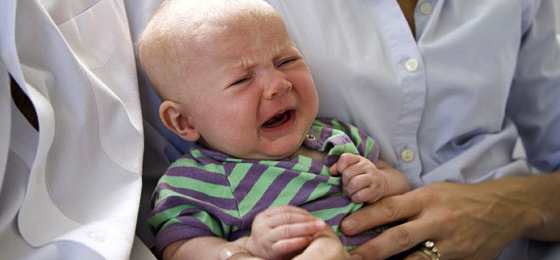- MENU
- HOME
- SEARCH
- WORLD
- MAIN
- AFRICA
- ASIA
- BALKANS
- EUROPE
- LATIN AMERICA
- MIDDLE EAST
- United Kingdom
- United States
- Argentina
- Australia
- Austria
- Benelux
- Brazil
- Canada
- China
- France
- Germany
- Greece
- Hungary
- India
- Indonesia
- Ireland
- Israel
- Italy
- Japan
- Korea
- Mexico
- New Zealand
- Pakistan
- Philippines
- Poland
- Russia
- South Africa
- Spain
- Taiwan
- Turkey
- USA
- BUSINESS
- WEALTH
- STOCKS
- TECH
- HEALTH
- LIFESTYLE
- ENTERTAINMENT
- SPORTS
- RSS
- iHaveNet.com: Parenting
by Harvey Karp, M.D.
Harvey Karp, M.D., pediatrician and author of The Happiest Baby on the Block, explains why babies cry so much -- and what we can do about it

Why Do Babies Cry?
If there's one thing everyone knows about babies, it's that they cry. Frequently. But why do healthy babies cry? The things that make them fuss (and things that won't) may surprise you.
"Babies are born three months before they're really ready for the world," says
Harvey Karp, M.D., renowned pediatrician and author of
The Happiest Baby on the Block
"What they need is for us to imitate the experience in the womb, which was very active."
In his 30 years of practice and study, Karp has found that baby crying occurs because:
First and foremost, they're missing the rhythms of the womb
Babies need constant stimulation and motion such as swinging, walking or jiggling. Skin-to-skin contact is also very soothing.
It's too quiet.
The sound of blood flowing in the womb is a loud"whoosh," so it should be no surprise that babies find white noise (such as the sound from the vacuum cleaner) calming.
They're hungry.
They need a diaper change.
They're simply uncomfortable.
"To put a baby in a quiet room by itself on a flat bed may be something you or I would like, but for a baby, it's sensory deprivation," says Karp.
And then there are some persistent myths to debunk.
As Karp explains >baby crying does not occur because:
They have gas pains.
Gas is one of the first things parents blame when babies are tearful, but Karp insists it's a highly unlikely cause of severe crying.
They're overstimulated by the world.
This is an old wives' tale, says Karp. When you remember that babies are surrounded by noisy, pulsating sounds inside the womb, you realize that it's just as likely -- if not more likely -- for a baby to feel upset by an under-stimulating environment.
They sense their mother's anxiety.
Babies aren't yet able to tell when their mothers are worried, explains Karp.
You can cope with a baby that's crying by using Karp's Happiest Baby techniques, which he calls "the five S's":
Swaddling
Wrapping a baby's arms and body securely with a blanket mimics the snug and comforting confines of the womb.
[ How to Swaddle Your Newborn Baby Step-by-Step Instructions Video ]
Side positioning
Hold baby in your arms on its side, slightly forward-leaning. Stomach positioning (aka tummy time) is also good, but never put newborns and very young babies to sleep face-down.
Shushing
Make a somewhat loud"shushing" sound near your baby's ear, or play a CD of white noise.
Swinging
Use a motorized infant swing when you need a break. Ones that recline and come with a secure harness are best.
Sucking
Give your baby a breast, a bottle or a pacifier. Sucking on something is a great distraction!
These techniques flip on your baby's calming reflex. Start with one S and add more as needed until your crying baby is soothed.
Available at Amazon.com: The Happiest Baby on the Block
AUTOS | HOBBIES | EDUCATION | FAMILY | FASHION | FOOD & RECIPES | HOME DECOR | RELATIONSHIPS | PARENTING | PETS | TRAVEL | WOMEN
Parenting: "Why Do Babies Cry?"